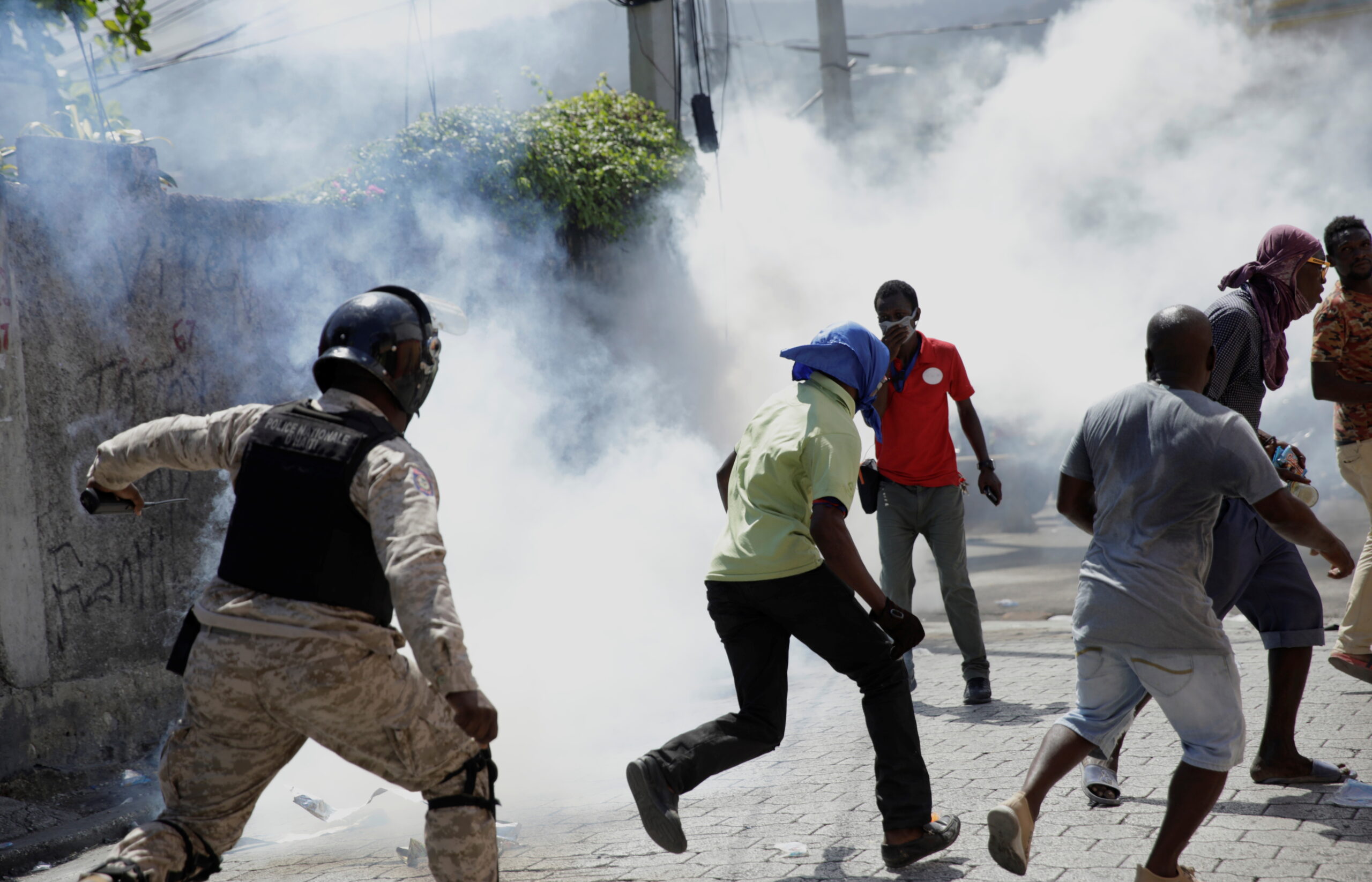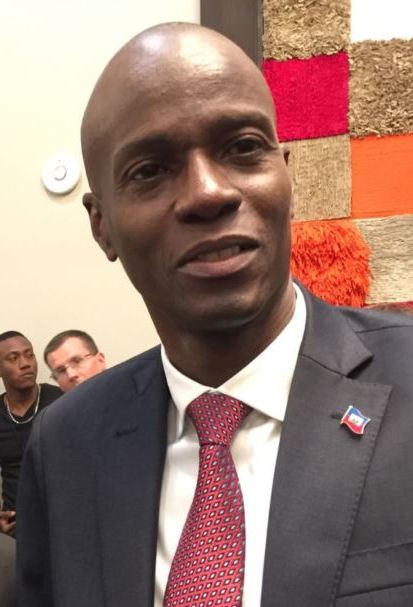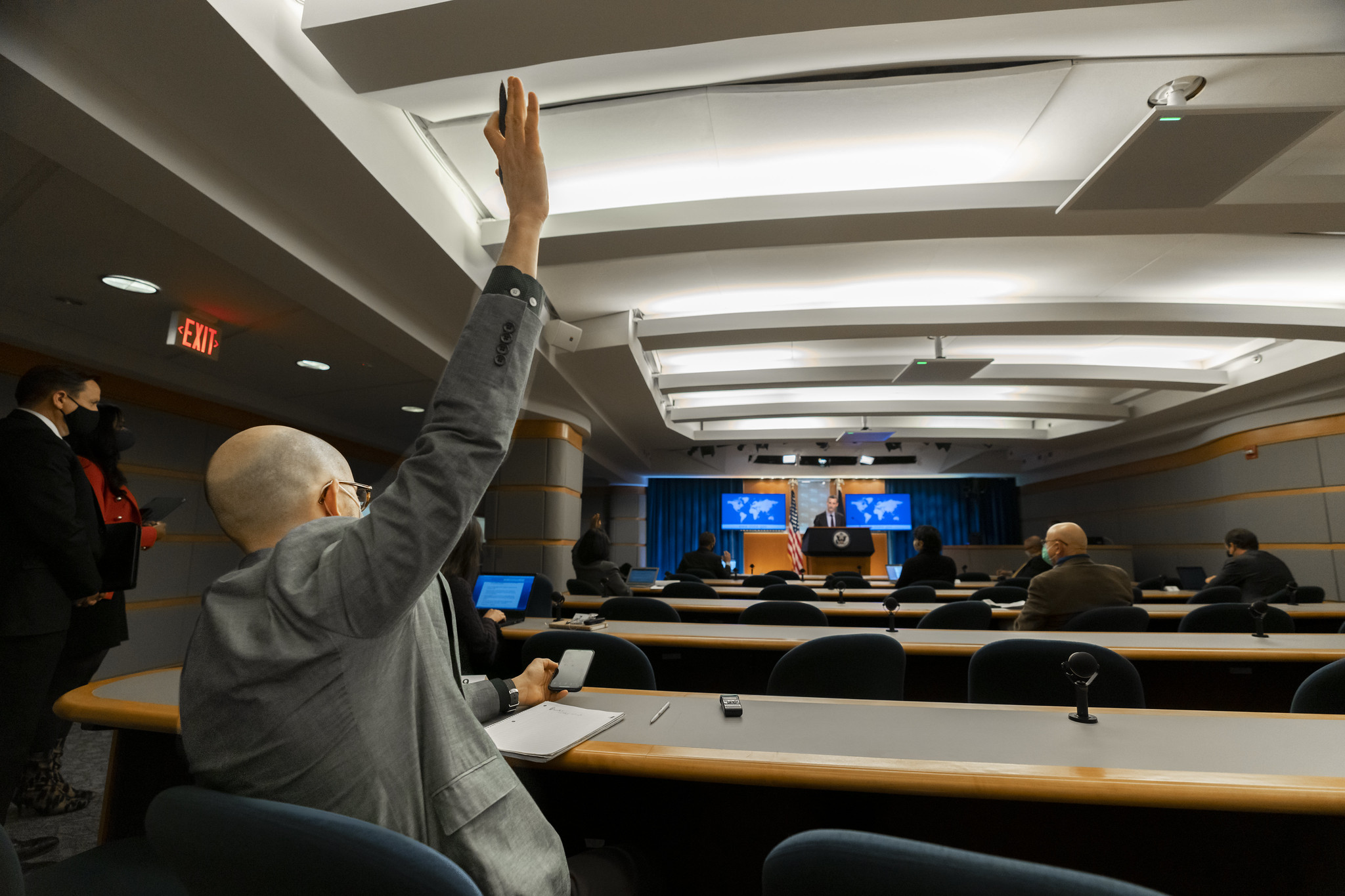Removing U.S. support would force Moïse to negotiate with his opponents, opening the way to a Haitian solution that builds the country’s independence, writes Brian Concannon.

Haitian police officer pursues demonstrators amid tear gassing, Nov. 20, 2020. (Al Jazeera, CC BY-SA 4.0, Wikimedia Commons)
By Brian Concannon
Responsible Statecraft
 As thousands of Haitians protest each Sunday against Jovenel Moïse, their embattled and increasingly authoritarian president, their protest signs and songs exhort the U.S. ambassador and the head of the United Nations mission in Haiti, who is also a career U.S. diplomat, “to stop supporting a dictatorship.”
As thousands of Haitians protest each Sunday against Jovenel Moïse, their embattled and increasingly authoritarian president, their protest signs and songs exhort the U.S. ambassador and the head of the United Nations mission in Haiti, who is also a career U.S. diplomat, “to stop supporting a dictatorship.”
The protests reflect a broad consensus among politicians, intellectuals, lawyers and others in Haiti, supported by human rights experts and members of the U.S. Congress, that the Biden administration is propping up Moïse and preventing the emergence of a Haitian-led solution to the political crisis.
The Trump administration had backed Moïse despite revelations of spectacular corruption, government-linked massacres, and the expiration of Haiti’s parliament.
In just one incident, the 2018 La Saline massacre, government-allied gangs killed at least 70 people to retaliate against anti-government organizing in the neighborhood. I interviewed survivors, and their stories were eerily similar to the stories I had heard 30 years before from the survivors of the 1988 St. Jean Bosco Church massacre — also in La Saline — by the vestiges of Jean-Claude Duvalier’s Tonton Macoute death squad.
Taking Moïse’s Side

Haitian President Jovenel Moise in 2017. (VOA Creole Service, Wikimedia Commons)
Haitians were hopeful that the Biden administration would change course before Feb. 7, the day that Moïse’s term in office ended, according to Haiti’s judicial oversight body, the bar federation, and religious leaders, as well as the leadership of the U.S. House Foreign Affairs Committee. But on Feb. 5, the State Department, citing the position of Luis Almagro, secretary-general of the Organization of American States, pronounced that Moïse’s term extended until 2022. This interpretation is based on a constitutional ambiguity generated by election delays in 2015 and 2016. But, as most commentators note, it is inconsistent with electoral law and with precedent set by Moïse himself.
Taking Moïse’s side might have been an attempt to manage Haiti’s political crisis at a time when the administration’s attention is focused elsewhere. But Moïse proceeded as if this support provided a green light for continued repression.
Before sunrise on Feb. 7, his police arrested Supreme Court Justice Yvickel Dabrésil and at least 19 other suspected dissidents, illegally, alleging they were planning a coup d’état.
The next day, Moïse, fired Dabrésil and two of his Supreme Court colleagues, who, under the country’s constitution, can only be removed by parliament. Haitians who protested the arrests and other autocratic measures were met with police beatings, tear gas and bullets, as were journalists covering the protests.
State Department Adds Gaslight
The State Department added gaslighting to its green light on Feb. 12, claiming there had been a “remarkable lack of popular response to calls for mass protest in recent weeks.”
The State Department knew very well that Haitian demonstrators had been subjected to violent attacks by government forces and allied militias once they marshaled in the streets. Indeed, the Department of Homeland Security reported in February that the government was using gangs “to repress the opposition,” and noted “President Jovenel Moïse’s increasingly authoritarian tendencies.”
With Washington nevertheless still backing Moïse, police escalated their attacks, shooting one journalist with rubber bullets 14 times on Feb. 14. Moïse’s Washington public relations firm ensured that the international press saw the State Department’s statement.
Braving the anticipated police attacks ordinary Haitians provided a remarkable popular response to the gaslighting with huge protests the following four Sundays in Port-au-Prince and several regional capitols. Haiti’s judges announced an indefinite strike to protest Moïse’s latest moves by closing down the courts.
Moïse’s most audacious power grab was setting a June 27 constitutional referendum, to precede parliamentary and presidential elections now set for September. If it goes forward, a referendum would flagrantly violate the existing constitution that was drafted just two years after “Baby Doc” Jean-Claude Duvalier “won” a constitutional referendum affirming him as president-for-life. It requires supermajorities in the parliament to approve amendments, and expressly prohibits “any popular consultation designed to modify the Constitution through a referendum.”

Jean-Claude and Michèle Duvalier en route to the airport to flee the country, Feb. 7, 1986. (Wikimedia Commons)
Moïse’s referendum is subtler than Duvalier’s, but possibly more dangerous. It would abolish the Senate and replace the prime ministerial system — which balances executive and legislative power — with a vice president named by the president, and would provide for direct presidential control over the ministries.
The referendum would also allow Moïse to handpick the electoral council that would organize the next two presidential elections, potentially extending his personal power as far as 2032. It would allow the president to directly command the army and grant total immunity for any actions “linked to his functions and accomplished in his role as President.”
But the Biden administration has failed to criticize Moïse’s referendum, while the United Nations has offered its technical assistance for its implementation. This is setting Haiti up for at least another year of escalating turmoil in the short term, unchecked and abusive executive power in the medium term, and stunted democracy and instability for as long as anyone can see into the future.
Haitians will pay the heaviest price for Moïse’s power grab, but the United States will pay, too. Dissidents will flee from repression and an economy devastated by political conflict no matter how many are sent back. Instability in Haiti will provide new opportunities for narcotics smuggling to the United States. U.S. resources will eventually have to be invested to help put Haiti back together again.
The State Department pushed back lightly and inconsequentially against Moïse’s Supreme Court takeover and the abuse of his decree powers, but has otherwise applied little pressure other than insisting that parliamentary elections take place.

Reporter raises hand during daily press briefing with State Department Spokesperson Ned Price. (State Department, Ron Przysucha)
But this plays directly into Moïse’s hands: for four years, as one deadline after another passed, he has promised elections while expanding his own powers. There is now no chance that elections will produce a parliament able to balance the president’s power until the last month or two of his term.
Moïse also knows from history that if he delays elections long enough, an impatient Washington will accept a manipulated process. Moïse’s two elected predecessors — Michel Martelly in 2015/2016 and René Préval in 2010 — both strung out elections until the Obama administration put its financial and diplomatic weight behind deeply flawed processes that produced the predicted catastrophic results.
Most Haitians, on the other hand, do not believe that Moïse will run fair elections after four years of systematically undermining democracy, so they will likely refuse to participate.
Further descent into autocracy in Haiti, however, is not inevitable, and the Biden administration can help stop it. Washington does not have to — and should not — bring Moïse down; rather, it should just stop propping him up.
Removing U.S. support would force Moïse to negotiate with his opponents, opening the way to a Haitian solution that builds, rather than undermines, the country’s independence.
Haitian civil society has forged a broad consensus that a transitional government headed by a Supreme Court justice charged with promptly organizing fair elections can provide a constructive exit from the crisis. They believe that the broad opposition to Moïse could compel him — non-violently — to accept a transition so long as the United States stopped propping him up. This path does carry some risk of further turmoil, but most Haitians would gladly accept that risk over the certainty of deepening autocracy under Moïse.
The Biden administration can start supporting a negotiated, Haitian-led solution to the political crisis by acknowledging the civil society consensus that Moïse’s legal term has ended. It can then oppose the pending constitutional referendum and refuse to provide any financial support — either directly or through the U.N. or the OAS — for its implementation.
Finally, the United States should apply its own sanctions laws wherever the evidence justifies it. In December, the Treasury Department imposed Global Magnitsky Act sanctions on two former Moïse administration officials implicated in the La Saline massacre, establishing a precedent for additional action against other officials engaged in repression or corruption. The State Department should also review the evidence of serious abuses by security forces and withhold funding and training to them under the Leahy Law.
Unchecked, Moise is steering Haiti toward a more authoritarian future. The Biden administration can use its considerable influence to change that trajectory.
Human rights lawyer Brian Concannon is executive director of Project Blueprint, which promotes a progressive, human rights-based U.S. foreign policy by bringing the perspectives of people impacted by U.S. actions abroad into policy discussions. He has written on human rights, U.S. foreign policy and international organization accountability for several newspapers and academic journals.
The article is from Responsible Statecraft.
The views expressed are solely those of the author and may or may not reflect those of Consortium News.



Why discuss this as though the Biden administration were not in favor of dictatorship in Haiti?
Concannon makes good points. Of course the US could stop this. Of course the US has supported it. But part of the usual memory hole problem here is the persistent notion that colonialization of Haiti is particularly a problem of presidential personality or party politics.
We need the whole oligarchy out of the saddle to slow this. Instead, we have a sort of tag-team totalitarianism.
“the head of the United Nations mission in Haiti, who is also a career U.S. diplomat”
— So it goes without saying that the UN, along with the OAS, supports the dictatorship.
Though the reported details of current and previous repression may be useful,
the mild tone of the article suggests that the State Department is misguided,
or that Biden would like to do the right thing, but doesn’t have the gumption.
And that both might care about the suffering of Haitians, which they obviously do not.
How about starting from the premise that however unsavoury the dictatorship,
and however awkward defending it is, Moïse is Washington’s chosen ruler?
Describing delayed and rigged elections as “deeply flawed processes” is language
from the New York Times and State Department (is there a difference?) to obfuscate.
Omitting any mention of the geopolitical context seems again like mainstream media.
For instance, Concannon ignores Canada’s and France’s support for Moïse’s regime.
And he could mention that despite previously receiving needed aid from PetroCaribe,
the Haitian regime installed by the U.S., Canada and France has turned against
its benefactor, Venezuela, and joined the Almagro-supported ‘Lima Group’
plotting to overthrow the government of Venezuela — one reason Uncle Sam
and toadies in Ottawa are determined to keep Haiti in line. Not to mention
the crucial role Haiti played two centuries ago in liberating Venezuela from
Spain, a theme Hugo Chavez acknowledged and praised many times.
Yet we are supposed to be obsessed with Venezuela…..
Haiti has been meddled with so much and so long, it is impossible to know what would happen in its politics if that heavy hand were suddenly removed.
I don’t say that to justify the heavy hand. I say it to object to the idea Haiti has any sort of real independent politics that would emerge fully functional if only the heavy hand were to let go.
Removal of US dominance would likely bring chaos at first, since there is nothing else there that is real. It would be like Afghanistan’s US backed puppet government with US support suddenly removed. Chaos. Unpredictable. Whatever would emerge is unknown and unknowable to us just now.
True. However Haiti is currently unjust, corrupt, violent, and chaotic. It appears that the heavy hand has been there long enough to constitute proof that the heavy hand does not change that.
If the hand were removed, Haiti would be unjust, corrupt, violent, and chaotic, but there is the possibility, at the least, that real change might occur. If it does there might be a functioning nation. If it doesn’t it might well be unjust, corrupt, violent, and chaotic.
The same might well be true of every one of the countries where we have laid our heavy hand with troops, supporting the troops of others, or simply sanctioning them to death (which has proven to be the most ineffectual Chinese drip torture in the book.) It has cost us economic ruin, our international reputation, and from many of us, our self-respect.
It did divert much of our taxes and some booty (like Iraq’s oil – ask Chevron – & Afghanistan’s heroin production) into the pockets of many of our almost tax-free corporations.
There’s a pecking order for major interventions like sanctions 1. the big, bad, Russia, China, Iran 2. Anyone marked Socialist: Cuba, Venezuela, Ecuador & several Central and South American countries 3. any nation Israel opposes: all Moslem nations, Palestinians.
So Haiti doesn’t fit the CIA picture of a country worth fiddling with, sort of like the Falkland Islands. Just because they are black doesn’t cut it. This is a traditional white, Democrat government with little tokens scattered around. The only one of any significance is the white- black lady who is so inexperienced that she can be controlled and 4 years from now she will know how things really work and submit.
Nothing new here except the names and the strategies and tactics. I read it because I knew nothing of recent developments, and the article was an excellent, well written synopsis. The same basic horror show since the Jefferson administration.
Please tell me when the USA (or France!) has even tried to do anything to help Haiti, which must be one of the poorest, most violent, most put-upon nation s in the world. Every case of intervention, far from “humanitarian”, makes the situation worse, and the one time there was a desired President, the USA, Franc, Canada removed him to ensure he did not help the people at all. This was early in this century and now it is 2021.
Exactly – and those who messed up Haiti and much of the world are often the same people who arrogate to themselves the right to be judge, jury, and often executioner of the countries they destroy.